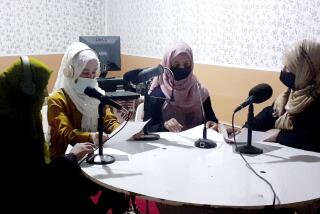Pirate Stations Strike a Sour Note in Israel
- Share via
JERUSALEM — Pirate radio stations? asks Israeli broadcaster Yisrael Bundak. What’s the problem?
He reaches over to his radio, tunes in Kol Hamizrach (Voice of the East), 92.6 on the FM dial. His pirate station of choice. The cheerful tunes of a Kurdish ditty come bouncing forth. What’s the problem?
If pirate radio stations broadcast only folk music, of course, there would probably be no problem. But Israeli authorities and media watchdog groups say the illegal, semi-clandestine stations are up to more than that. In addition to broadcasting without a license, a number are accused of using the airwaves to stir up violence.
And lately, several have been accused of transmitting on frequencies that interfere with legitimate broadcasters and, worse, with air-traffic controllers.
Tel Aviv’s Ben Gurion International Airport was forced to halt flights several times last month because of interference. Pilots told local newspapers of trying to tune in the control tower for landing instructions only to find pirate music and religious sermonizing. (The pilots switched channels back and forth and eventually found air control.)
As authorities began to speak of cracking down, one pirate station, Kol Haneshama (Voice of the Soul), responded by calling on listeners to take to the streets and kill judges, police and all the secular public bent on silencing it.
“We will use a thousand knives against you,” the announcer intoned. “If we have to slaughter, then we will slaughter.”
Like everything else in Israel these days, this apparent battle over the airwaves is actually an extension of a deeper struggle over culture, politics and religion.
Of the estimated 150 unlicensed stations, several dozen are operated by ultra-Orthodox Jews and Sephardic or Mizrahi groups, Jews who trace their ancestry to Arab and North African countries. They feel greatly repressed by Israel’s European, or Ashkenazi, elite and secular majority, and they say they are being targeted once again in the radio crackdown.
Bundak and others say the pirates fill a void by providing the cultural and religious programming that mainstream, elitist broadcasters have largely refused to air. And they most adamantly maintain that they are not responsible for any interference with air-traffic frequencies.
“They claim we are robbers of the airwaves. Well, they robbed our culture,” Bundak said. “The crackdown is a witch hunt against Mizrahi culture.”
Bundak started Kol Hamizrach in 1992 but relinquished control a few years ago. He had his own brush with the law earlier this year when he was accused of broadcasting a call for the murder of a prominent leftist politician. He says it was just a joke.
A handful of illegitimate stations helped campaign on behalf of Shas, an ultra-Orthodox Sephardic political party that managed to increase its share of parliament by a staggering 70% in May 17 elections.
Yizhar Beer, an activist with the Center for the Protection of Democracy in Israel who has been monitoring pirate radio transmissions for nearly two years, said the insidious incitement from some of the broadcasts undermines Israel’s fledgling democracy.
“They want to create an alternative media system, which leads to an alternative legal system and an alternative police system, and this is very bad for our society in crisis,” Beer said. He warned that the proliferation of extralegal media will lead to a “Lebanon-ization” of Israeli society, an allusion to the sectarian fragmentation that plunged Lebanon into civil war in the 1970s.
Groups like Shas have built a radio network that Beer says attacks the Israeli judicial system as “Bolshevist” and regularly uses racist slurs against anyone who is not a conservative Sephardic Jew. One station routinely assailed Prime Minister Yitzhak Rabin as a Nazi, up until he was slain by an extremist Jew.
The outgoing government of right-wing Prime Minister Benjamin Netanyahu not only tolerated the stations, on election day Netanyahu gave interviews on several of them in violation of election laws. He also tried to pass legislation that would legitimize many of the stations. The center-left Labor Party-led government that emerges from last month’s election is likely to be less obliging.
More to Read
Sign up for Essential California
The most important California stories and recommendations in your inbox every morning.
You may occasionally receive promotional content from the Los Angeles Times.














